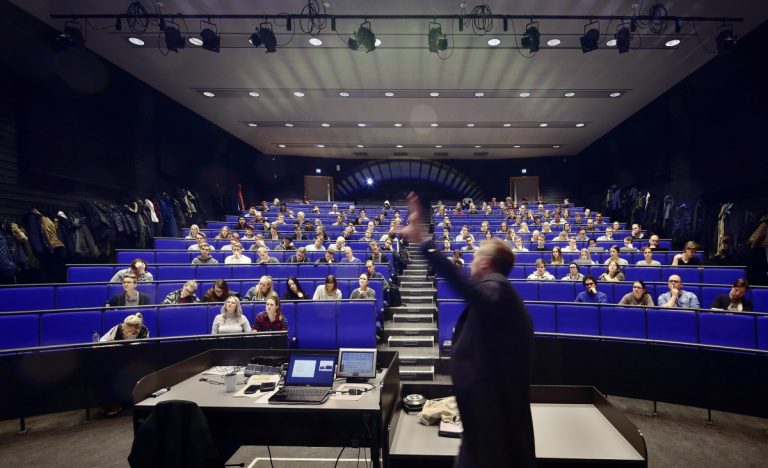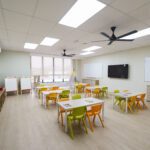
Due to its geographic nature as a global hub of international collaboration and ideas, Europe is at the frontline of innovation and research, as technologies and knowledge from multiple countries easily transcend global borders. Wilhelm von Humboldt founded the University of Berlin with the symbiotic intention of instructors sharing research and ideas with students, and student enquiries producing feedback.
Humboldt’s basis for a research university transformed today’s models for research-led educational innovation, going further than student-teacher benefits. “Most of tomorrow’s economy is being born today in university research laboratories,” he said.
The European Credit Transfer System (ECTS) was formed from an understanding of how beneficial a movement of ideas is to developing sectors and globally-focused fields of study. The system allows students attending a European university to transfer to another institution on the continent or further afield, easily transferring their credits.
This allows students attending research Universities to expand the scope of their education, granting further access to resources and opportunities.

European Universities have actively embraced beneficial collaboration in regard to shared resources and dedication to research. In 2002, the League of European Research Universities (LERU) was founded as an association of multi-faculty research institutins dedicated to exploring the frontiers of new knowledge, and promoting educational exploration as a partnership tool for improving industry and society.
LERU’s regard for research-focused learning has spread within a global network of partnering groups, such as RU11 in Japan, and U15 of Germany, that work towards a global standard for research Universities.
As per the Hefei Statement signed by twelve International institutes, ideal research Universities aim to demonstrate ten characteristics of distinction, for example: the pursuit of excellence in research efforts, producing nurturing and creative environments for staff and students, maintaining high standards of research integrity and ethical rules, and supporting local and international communities via research-lead projects. Students can be assured that engaged research Universities tailor their course content around current industry innovations, and will help them become successful contributors to the futures of their chosen fields by being at the forefront of developing ideas.
Research University projects are seen as sound choices for business investment and students alike, serving as bridges between industries and the frontier of developing knowledge. They provide fresh insights to both businesses, and the students and faculty, with student placements as useful catalysts for bringing innovation to the workplace.
An example of the bridge effect of research is the Swedish Academic Collaboration Forum, a collaboration between six Swedish Universities and partnerships in South Korea, Singapore, China, Indonesia and Brazil. The joint research venture over the Gripen fighter aircraft between Linköping University and aerospace company Saab demonstrates how shared knowledge can produce breakthrough technologies in industry.
Students seeking to study in rapidly-developing and internationally-centric fields would benefit from the multitude of study and industry opportunities that European Research Universities offer.
LINKÖPING UNIVERSITY (LiU) – SWEDEN

Linköping University officially gained University status in 1975, and has since expanded its campus grounds to around 27,000 multi-national students and 4,000 staff. Over the past five years, the University has climbed about 100 places, and now ranks amongst the world’s top 300 university (Academic Ranking of World Universities 2017).
LiU runs a multitude of undergraduate and professional degree programmes, but most notably the University offers over 25 international master’s programmes, taught in English, in rapidly developing fields like Design, Ethnic and Migration Studies, Experimental and Biomedical Sciences, and Science for Sustainable Development.
LiU is a thriving and inspiring academic institute, spread across four campuses in three cities, Campus Valla, University Hospital Campus, Campus Norrköping, and Campus Lidingö. All are equipped with state-of-the-art resources like auditoriums, labs, the Clinicum for clinical skill practice, workshops, and nearby external research facilities, like the National Supercomputer Centre.
Linköping’s research successes lie in a broad topic approach and a ‘lack of boundaries’ between and faculty schools, however, LiU also explores Strategic Research Areas with a global focus in business, governance, and industry, in fields like Materials Sciences and Security Management. LiU students have access to top-class resources, and labs committed to conducting ‘research that makes a difference’. At LiU, students can fully engage with their explorations and education to become multi-faceted, accomplished graduates.
If you are interested in learning more about Linköping University, please click here.
UNIVERSITY OF SOUTHERN DENMARK (SDU) – DENMARK

Established in 1998 from a merging of four separate schools, SDU fully embraces the ethos of collaborative efforts towards research and education. SDU also holds strong partnerships with University of Flensburg and the University of Kiel in joint transfer programmes.
The course selection at SDU includes undergraduate and postgraduate courses and study programmes, taught in either Danish or English, across five faculties; inclkuding the Humanities, Science, Engineering, Social Sciences, and Health Sciences. The University resources are vast, with involvement with over 30 research centres, the University Library of Southern Denmark, and the network hub.
SDU research topics include Pharmaceutical testing, Health Economics, and Environmental and Business Economics, and topics are generally focused on innovating society and business spheres, one example being a cooperation between SDU and Mads Clausen Institute in intelligent product design.
SDUs’s Professor Dr. Per Aagaard demonstrated the University’s outreach approach to research in his seminar at the Lithuanian Sports University, where he shared his findings into muscle fatigue and injury prevention.
Evidently, both SDU Teachers and students are encouraged to foster links with local business and research centres, in the spirit of bettering the quality of their education, as well as the industry standards of fields future students hope to work within.
MAASTRICHT UNIVERSITY (UM) – NETHERLANDS

As the most International University in the Netherlands, over 40 percent of UM’s student base are foreign students. UM’s ‘International Classroom’ approach to lessons encourages a variety of perspectives and backgrounds that ‘serves to prepare students for the rapidly changing and globalising labour market.’
With over 15 English-speaking bachelor programmes, and 55 English-speaking Masters and postgraduate courses, UM offers an extensive variety in relevant research-linked fields such as European Studies on Society, Science and Technology, Biomedical Sciences, and Globalisation and Law.
UM’s EDLAB is a pioneering institute for education innovation, dedicated to fine-tuning teaching methods, employability, and research-led teaching concepts.
Geographically in the ‘heart of Europe’, UM is the perfect location for students looking for exchange opportunities and international research centres, as UM is also a member of the Worldwide Universities Network (WUN), and cultivates efforts in cross-discipline and cross-border research.
UM encourages students to embrace collective teachings and seek new horizons, which produces graduates with the creative vision and inquiring mindsets needed to make research a reality.
UNIVERSITY OF EASTERN FINLAND (UEF) – FINLAND

Home to around 15,000 students, UEF encompasses three campuses: Joensuu , Kuopio, and Savonlinna, with each housing highly-functional resources, such as the Technopolis building, home to Kuopio Science Park, plus high-tech labs and teaching rooms.
Offering a collection of international study programmes taught in English, UEF’s courses run for both Bachelor’s and Master’s-level students, with further postgraduate study being made available through the Doctoral School. UEF also welcomes international students with its exchange programme and summer school.
UEF Master’s subjects are diverse and heavily-involved in multi-disciplinary exploration, with courses like Border Crossings: Global and Local Societies in Transition, International Business and Sales Management, and Photonics.
UEF is committed to advancing expertise and knowledge, and is invested in multiple projects with Centres of Excellence, like UEF’s involvement in Nordic Centres of Excellence project CRAICC: Cryosphere-Atmosphere Interactions in a Changing Arctic Climate.
At UEF, ‘interdisciplinarity is not something we do, it’s who we are’. Here, students capitalise on the barrier-breaking research pursued at UEF to help shape the cutting-edge teaching these future pioneers receive.
*Some of the institutions featured in this article are commercial partners of Study International
Liked this? Then you’ll love these…
Study Natural Sciences at Maastricht University
UEF Law School: Providing a base of knowledge for tomorrow’s most powerful leaders







